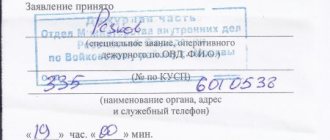ST 25 of the Criminal Code of the Russian Federation.
1. A crime committed intentionally is an act committed with direct or indirect intent.
2. A crime is recognized as committed with direct intent if the person was aware of the social danger of his actions (inaction), foresaw the possibility or inevitability of the occurrence of socially dangerous consequences and desired their occurrence.
3. A crime is recognized as committed with indirect intent if the person was aware of the social danger of his actions (inaction), foresaw the possibility of socially dangerous consequences, did not want, but consciously allowed these consequences or was indifferent to them.
Commentary to Art. 25 Criminal Code
1. The legislator divides intent as a form of guilt into direct and indirect intent; Judicial practice adds to this the division of intent into premeditated and sudden, as well as definite and indefinite (including alternative).
2. Direct intent, from the point of view of its intellectual element, presupposes that a person is aware of the social danger of his actions (inaction) and anticipates the possibility or inevitability of the occurrence of socially dangerous consequences.
A person’s awareness of the social danger of an act is based on his understanding of the factual circumstances of what is being committed, which form legally significant objective signs of a specific crime.
Anticipating the possibility or inevitability of socially dangerous consequences comes down to anticipating actual changes in the world around us in the future, understanding their social significance and understanding, in general, the cause-and-effect relationships between what is happening and what is happening in the future. Foreseeing the inevitability of consequences means such a person’s idea of the future in which he does not allow for another scenario. Foreseeing the real possibility of consequences occurring means such a person’s idea of the future in which he admits a different scenario for the development of events, but reasonably hopes that it will happen exactly as he imagines.
The volitional element of direct intent presupposes the desire for socially dangerous consequences to occur (in this case, the person’s emotional attitude towards the upcoming consequences can be different, including negative).
3. The intellectual element of indirect intent coincides with the similar element of direct intent, except that there is no foresight of the inevitability of socially dangerous consequences, which, by force of law, characterizes only direct intent.
The volitional element of indirect intent is characterized by the presence of a conscious assumption of consequences or an indifferent attitude towards them.
4. Depending on the certainty of the subject’s understanding of the consequences of the act committed, intent can be definite and indefinite, including alternative.
With a certain intent, a person clearly foresees the upcoming consequences. If the intended consequences do not occur, the crime is classified as an attempted crime.
With undefined intent, a person foresees several consequences that are equally possible to occur (with alternative intent, two consequences). In this case, the crime is classified according to the actual consequences that occurred.
5. Intentional crimes that do not imply the occurrence of consequences as a mandatory sign of an objective party (formal crimes) can only be committed with direct intent, when a person is aware of the social danger of his actions (inaction) and wants to commit them.
Article 25 of the Criminal Code of the Russian Federation. Crime committed intentionally
1. There are two types of intent:
- 1) straight;
- 2) indirect.
With direct intent, a person:
- a) is aware of the social danger of his act;
- b) foresees the possibility or inevitability of consequences;
- c) wants them to happen.
The first two signs characterize the intellectual sphere of mental activity, the third - volitional. Intelligence reflects and reproduces reality; the will shows the attitude towards what is happening.
Awareness of the danger of an act includes an understanding of the actual nature of the act being committed and its social significance. The actual nature of the act is its external side. To understand the actual nature of an act means to understand what a person commits in everyday life: strikes, destroys a thing, etc. Awareness of social significance presupposes an understanding of how this act affects other people, how it affects social relations. Understanding the factual side of an act mostly means understanding its social significance. However, due to knowledge, experience, and the circumstances of the commission of the act, there may be a mismatch between the understanding of the factual and social aspects.
Anticipation of consequences is a person’s mental representation of the changes that will occur in the future as a result of the committed act. With direct intent, a person foresees both the inevitability and the possibility of consequences. Inevitability presupposes the certainty of the occurrence of a consequence. Possibility means understanding the likelihood of their occurrence. In this case, we are talking about the subjective perception of the possibility or inevitability of the occurrence of consequences, i.e. as the person himself believes, and not how it really is, i.e. objectively. Thus, a person may consider the onset of consequences to be inevitable, whereas in fact their occurrence is possible; it may consider the occurrence of consequences possible, although in fact their occurrence is impossible. Here it is important to find out exactly the subjective attitude of the person, since we are talking about foreseeing the consequences specifically for them, and not for someone else.
2. A crime with indirect intent in its intellectual aspect almost completely coincides with a crime with direct intent. It also contains awareness of the social danger of the act being committed and the anticipation of the onset of socially dangerous consequences. However, there is a certain difference in anticipating consequences.
With indirect intent, only the possibility of consequences occurring is foreseen, which is explained by the obligatory presence in the mind of the person of an idea about the side lines of development of the event in question. Accordingly, the volitional moment of indirect intent is not aimed at causing a socially dangerous consequence. The person accepts it, agrees with it, or is indifferent to it. Thus, the main difference between indirect intent and direct intent lies in the volitional moment - in the absence of desire for consequences, although in accepting them in the event of the implementation of a side option for the development of the event.
3. The division of intent into direct and indirect is taken into account by judicial practice when qualifying crimes and imposing punishment (see paragraphs 1 and 2 of the Resolution of the Plenum of the Supreme Court of the Russian Federation of January 27, 1999 No. 1 “On judicial practice in cases of murder (Article 105 of the Criminal Code of the Russian Federation)").
4. To qualify crimes committed with direct intent, the direction of intent is important, i.e. mobilization of intellectual and volitional efforts to achieve certain consequences, the implementation of one or another method of committing a crime.
S. was convicted under Part 3 of Art. 213 CC. At night, while in a cafe, he fired three shots from a firearm at a security guard on duty in the cafe, causing moderate harm to health. The court came to the conclusion that S. committed unlawful acts in a public place for no reason, created a real danger to the life and health of citizens, and violated the operating hours of the cafe.
This qualification was found to be erroneous. S. fired shots at the victim’s legs not out of hooligan motives, but because of a previous conflict, and also due to the fact that in response to his request to be allowed into the cafe in order to find a chain lost there during a quarrel, the guards used rubber batons and they drove him away. Public order was not violated as there were no visitors in the cafe. S.’s actions were reclassified under Part 1 of Art. 112 of the Criminal Code.
Second commentary to Art. 25 of the Criminal Code of the Russian Federation
1. In accordance with the law, intent is manifested in two forms - direct and indirect.
2. Direct intent is characterized by three characteristics:
a) awareness of the public danger of one’s actions (inaction);
b) foreseeing the real (i.e. for a given specific situation) possibility or inevitability of the onset of socially dangerous consequences;
c) the desire for these consequences to occur.
The first two signs form the intellectual element of direct intent, and the third is its volitional element.
3. With direct intent, the desire consists in the desire for certain consequences, which can act for the perpetrator as:
1) the final goal (murder out of jealousy, revenge);
2) intermediate stage (murder in order to facilitate the commission of another crime);
3) means of achieving the goal (murder in order to obtain an inheritance);
4) a necessary accompanying element of the act (for example, murder with the use of an explosive device, when other people will inevitably die along with the intended victim).
4. The intellectual element of indirect intent includes two signs: a) awareness of the public danger of one’s actions (inaction),
b) foreseeing the real (i.e., for a given specific situation) possibility (but not inevitability) of the occurrence of socially dangerous consequences. The volitional element of this type of intent is characterized by two alternative characteristics: either the conscious assumption of socially dangerous consequences, or an indifferent attitude towards them.
5. Conscious acceptance of consequences means an approving attitude towards them, a subjective readiness to accept their occurrence. An indifferent attitude means that the subject did not think about these consequences at all.
6. A strict distinction between intent into direct and indirect is necessary for the correct application of a number of criminal legal institutions (preparation, attempt, complicity, etc.), for the qualification of crimes, the legislative description of which assumes only direct intent, for determining the degree of public danger of the act and the identity of the perpetrator , as well as to individualize criminal liability and punishment.
Termination of a criminal case through reconciliation of the parties (Article 25 of the Code of Criminal Procedure of the Russian Federation)
Exemption from criminal liability is the state’s refusal to implement it in relation to the person who committed the crime, in particular from convicting and punishing such a person.
Termination of a criminal case due to reconciliation of the parties is the most common basis for exemption from criminal liability.
This basis is non-rehabilitative.
The legislator has established an exhaustive list of requirements necessary to terminate a criminal case: bringing a person to criminal responsibility for the first time; the person has committed a crime of minor or medium gravity; mandatory reconciliation with the victim; making amends for the harm caused to the victim (compensation for material or moral damage, absence of claims from the victim).
If at least one of these conditions is not present, then the court cannot make a decision to terminate the criminal case, and therefore there will be no release of the person from criminal liability.
Part 2 of the Resolution of the Plenum of the Supreme Court of the Russian Federation “On the application by courts of legislation regulating the grounds and procedure for exemption from criminal liability” dated June 27, 2013 No. 19 determines that, in particular, the person who has committed a crime for the first time should be considered:
a) who has committed one or more crimes (regardless of their classification under one article, part of an article or several articles of the Criminal Code of the Russian Federation), for none of which he was previously convicted;
b) the previous sentence in respect of which at the time of commission of the new crime did not enter into legal force;
c) a previous sentence in respect of which at the time of the commission of a new crime came into legal force, but at the time of its commission one of the circumstances had occurred that annulled the legal consequences of bringing a person to criminal responsibility (for example, the person was released from serving a sentence due to the expiration of the statute of limitations execution of a previous conviction, expungement or expungement of a criminal record);
d) the previous sentence in respect of which came into force, but at the time of the trial the criminality of the act for which the person was convicted was eliminated;
e) who was previously exempt from criminal liability.
At the same time, the indication in Article 25 of the Code of Criminal Procedure of the Russian Federation that the court has the right, and not the obligation, to terminate a criminal case does not imply the possibility of the court arbitrarily deciding this issue solely on the basis of its discretion. When considering the victim’s application to terminate a criminal case in connection with the reconciliation of the parties, the body or official conducting criminal proceedings does not simply state the presence or absence of the grounds for this specified in the law, but makes an appropriate decision taking into account the totality of the circumstances of a particular case.
When making a decision, it is necessary to comprehensively examine the nature and degree of public danger of the crime, information about the personality of the defendant, other circumstances of the case (whether the person was properly recognized as a victim, his financial situation, whether pressure was exerted on the victim for the purpose of reconciliation, what actions were taken by the perpetrator in order to make amends for the harm caused by the crime, etc.). When making a decision, one should assess whether it corresponds to the goals and objectives of protecting the rights and legitimate interests of the individual, society and the state.
The Constitutional Court of the Russian Federation in its Determination of June 21, 2011 N 860-О-О “On the refusal to accept for consideration the complaint of citizen Evgeniy Vladimirovich Zyablin about the violation of his constitutional rights by Article 76 of the Criminal Code of the Russian Federation” indicates that the implementation of the provisions of Article 76 The Criminal Code of the Russian Federation and Article 25 of the Criminal Procedure Code of the Russian Federation are aimed at achieving the constitutionally significant goals of differentiating criminal liability and punishment, strengthening their corrective effect, preventing new crimes and thereby protecting the individual, society and the state from criminal attacks. It is also noted that the right of an authorized body or official who considers an application to terminate a criminal case does not mean an arbitrary resolution of this issue, since they do not simply state the presence or absence of grounds specified in the law for this, but make an appropriate decision taking into account all set of circumstances, including changes in the degree of social danger of the act after reparation of the harm.






